Rigoletto
Giuseppe Verdi
Opera in three acts
Libretto: Francesco Maria after Victor Hugo's play Le roi s'amuse
World premiere: 11 March 1851, Gran Teatro La Fenice, Venice
Polish premiere: 8 November 1853, Teatr Wielki, Warsaw
Premiere of this production: 12 March 1997
In the original Italian with Polish surtitles
'Questa o quella: per me pari sono,' when asked in a TV interview about her favourite opera number, the French singer Dalida hummed the Duke of Mantua’s aria from Rigoletto. Her most treasured childhood memories included the evenings on which her father would take her to the Cairo Opera, where he played the first violin. Rigoletto was actually performed at the inauguration of the Cairo Opera in 1868. It was supposed to be Aida, which had been commissioned from Verdi for the occasion, but the composer did not manage to finish it in time. Rigoletto – a tale of a court jester – takes on the topic of pranks: pranks in courtly culture, theatre culture, pranks as a safety valve, as well as the moral boundaries and risks inherent in pranking. The dark and the light contrast not only both in the story and the music, but also in stage pictures created by set designers. In the legendary staging from 1982 starring Luciano Pavarotti, Jean-Pierre Ponnelle paints a fresco inspired, amongst others, by Palazzo del Te built in Mantua in the sixteenth century by Federico II Gonzaga. The Warsaw staging by Gilbert Deflo, designed by Ezio Frigerio, is similarly visually rich. Rigoletto is also a story about the ties and love connecting a father and a daughter, about how to protect what one holds most dear, what one recognizes as true – in courtly realities. It is a question about authenticity and its price. Is it really true what Heinrich Boell writes in one of his novels: 'Irony does not suffice and shall never suffice (…), it is merely a drug for the privileged'?
Cast
Credits
Synopsis
Sponsors
-
Mecenas Teatru Wielkiego - Opery Narodowej
-
Partnerzy Teatru Wielkiego - Opery Narodowej
-
Partner Spektaklu
-
Patroni medialni Teatru Wielkiego - Opery Narodowej
-
Patron of Teatr Wielki - Polish National Opera
-
Partners of Teatr Wielki – Polish National Opera
-
Partner of the performance
-
Media patrons of Teatr Wielki – Polish National Opera






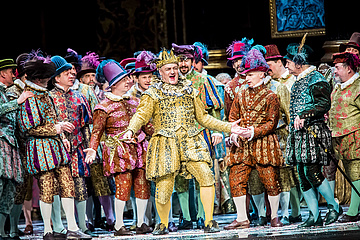
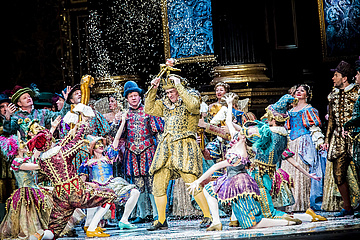
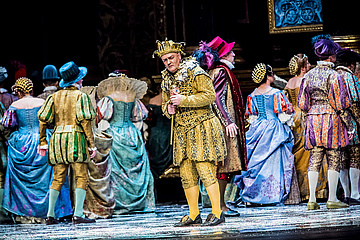
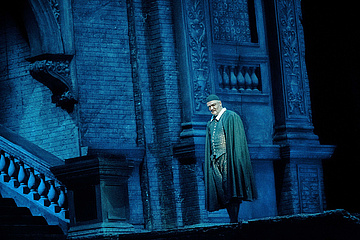
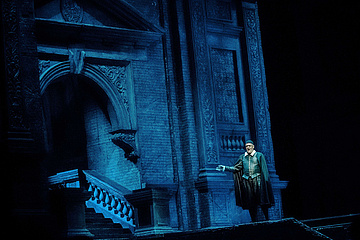
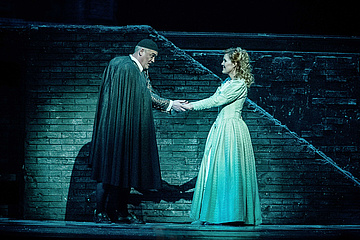
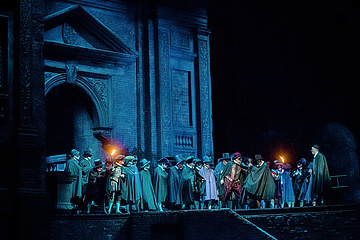
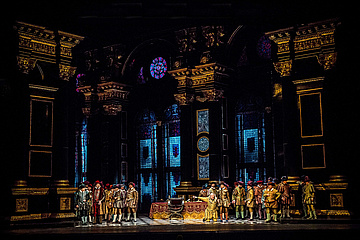
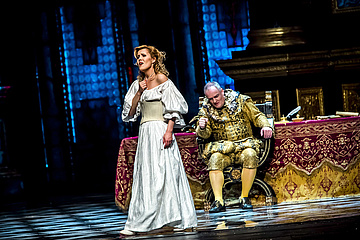
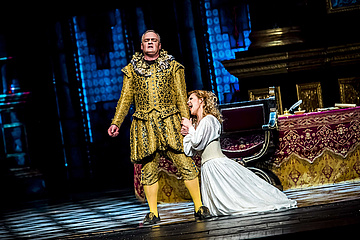
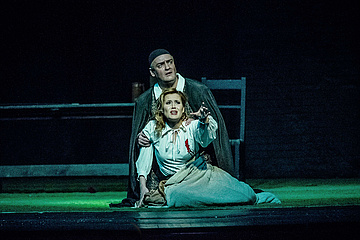
 Tadeusz Szlenkier
Tadeusz Szlenkier  Mikołaj Zalasiński
Mikołaj Zalasiński  Aleksandra Kubas-Kruk
Aleksandra Kubas-Kruk ![[Translate to English:]](/fileadmin/_processed_/6/f/csm_remigiusz_lukomski_kwadrat_05aa478a8d.jpeg) Remigiusz Łukomski
Remigiusz Łukomski  Anna Bernacka
Anna Bernacka  Robert Dymowski
Robert Dymowski  Mateusz Stachura
Mateusz Stachura  Piotr Maciejowski
Piotr Maciejowski  Czesław Gałka
Czesław Gałka  Magdalena Idzik
Magdalena Idzik ![[Translate to English:]](/fileadmin/_processed_/5/b/csm_damian_wilma_2024_-_kwadrat_bf794b4cfc.jpg) Damian Wilma
Damian Wilma  Jeanette Bożałek
Jeanette Bożałek  Magdalena Freino
Magdalena Freino  Otar Jorjikia
Otar Jorjikia  Jorge Lagunes
Jorge Lagunes  Aleksandra Olczyk
Aleksandra Olczyk  Monika Ledzion-Porczyńska
Monika Ledzion-Porczyńska  Krzysztof Szmyt
Krzysztof Szmyt  Grzegorz Nowak
Grzegorz Nowak ![[Translate to English:]](/fileadmin/_processed_/8/d/csm_Gilberto_Deflo_kwadrat_6563b0c263.jpg) Gilberto Deflo
Gilberto Deflo ![[Translate to English:]](/fileadmin/_processed_/7/b/csm_Ezio_Frigerio_9ff667e8ae.jpg) Ezio Frigerio
Ezio Frigerio  Franca Squarciapino
Franca Squarciapino  Zofia Rudnicka
Zofia Rudnicka  Stanisław Zięba
Stanisław Zięba  Mirosław Janowski
Mirosław Janowski 


